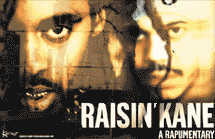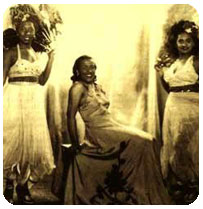African Canadian Film Festival & Evening Gala
Saturday, February 1
Museum London, 421 Ridout Street North
11am - 7pm
Films will begin showing at 11 am and finish at 7 pm with doors opening at 10:30 am. Seating is limited to 150 people per film. Free tickets for film screenings
are to be picked up in advance on a per film basis at
the info desk at Museum London after January 23, 03. There will be a 10 minute break between each film. Unclaimed seats will be assigned on a first come first serve basis the day of the event.
The films being shown are in the order as follows.
Speakers for the Dead - 11 a.m.
2000, 49 min 47 s
In the 1930s in rural Ontario, farmer Bill Reid buried the tombstones of a Black cemetery under a pile of broken rocks to make way for a potato patch. In the 1980s, descendants of the original settlers, Black and White, came together to restore the cemetery--but there were hidden truths no one wanted to discuss. Deep racial wounds were opened. Scenes of the cemetery excavation, interviews with residents and re-enactments--including one of a baseball game where a broken headstone is used for home plate--add to the film's emotional intensity.
Meet Helen and Alan Miller, seventh-generation Black Canadians and members of the cemetery restoration committee. And Les Mackinnon, a fiery, fourth-generation Scottish Canadian who heads the movement to restore the Priceville cemetery. Speakers for the Dead reveals the turmoil stirred up by desecrated graves and underlines the hidden history of Blacks in Canada.

_________________________________________
The Road Taken - 12:00 p.m.
1996, 52 min 02 s
 A nostalgic ride through history, The Road Taken documents the experiences of Blacks who worked as sleeping-car porters on Canada's major railways from the early 1900s through the 1960s.
A nostalgic ride through history, The Road Taken documents the experiences of Blacks who worked as sleeping-car porters on Canada's major railways from the early 1900s through the 1960s.
There was a strong sense of pride among the porters--they were well-respected by their community, and they had steady work and were able to provide for their families. Yet, harsh working conditions were a bitter reality and there were no opportunities for promotion to other railway jobs. Finally, in 1955, porter Lee Williams charged the railway companies and the porter's union with discrimination under the Canada Fair Employment Act, and Blacks were able to work in other areas.
Interviews, archival photos, and memorable film footage of train travel combine with the music of noted Toronto jazz musician Joe Sealy, whose father was a porter, to reconstruct a fascinating history that might otherwise have been forgotten.

_________________________________________
Talespinners Collection (4 animated shorts) - 1:00 p.m.
Storytelling is one of our oldest traditions. The Talespinners collection for children 5 to 9 uses vibrant animation to bring popular stories from around the world to the screen, showing how rich Canadian culture becomes with each new generation of artists and writers. This collection includes:
Christopher Changes His Name
2000, 6 min 30 s
Christopher hates his name - it's just too common! When Aunt Gail from Trinidad tells him a story about a larger-than-life character called Tiger, Christopher changes his name to Tiger. But then he finds a better name... When he has trouble cashing Aunt Gail's birthday cheque made out to Christopher Mulamba, he realizes how special his real name truly is. Maybe he could stick with it... or maybe not!
Christopher, Please Clean Up Your Room!
2001, 6 min 58 s
Christopher is a terrific kid. He's cool, he's nice and he's smart. But he has one big problem... he's messy! His shoes smell funky, his fish bowl stinks... even the cockroaches can't stand it. In the chaos of Christopher's room, his fish rise up from their scummy bowl in protest. They enlist the help of a fastidious, well-connected cockroach. Together, the fish and the roaches hatch a plan that will change Christopher's life and his cleaning habits forever.
The Magic of Anansi
2001, 6 min 51 s
Anansi the spider is tired of being looked down on by all the jungle animals--just because his webs don't catch bugs. The fearsome Mr. Tiger promises to respect the little spider if he brings him Mr. Snake, the world's grumpiest creature. After much wily scheming and plotting, Anansi delivers a humiliated Mr. Snake to Mr. Tiger. Only then does he realize that Mr. Tiger's respect comes at too high a price. Anansi doesn't want to make anyone miserable, not even Mr. Snake. Anansi stands up to Mr. Tiger and, in the end, this is what wins him the respect of the other creatures.
Roses Sing on New Snow
2002, 7 min 04 s
Maylin cooks mouth-watering meals at her father's restaurant in Chinatown, but her father and brothers take all the credit. When a dignitary from China arrives for a sumptuous banquet, Maylin's father serves him her special dish, Roses Sing on New Snow. The visitor is so impressed that he demands the recipe! After her brothers fail miserably at recreating it, the father must call for his daughter. Maylin demonstrates as the dignitary follows every step. After tasting his own cooking, the man realizes he cannot duplicate the dish. The chef is the most important ingredient of all! Maylin finally receives the credit she deserves for her inspired fusion of Old and New World cuisine.

_________________________________________
Colour Blind - 1:45 p.m.
1999, 25 min 42 s
Colour Blind is a film about subtle racism and its daily impact on teenagers in high school. To outsiders, Princess Margaret Senior Secondary, in the heart of Surrey, BC, looks like an ordinary high school. To teachers and students, however, it was a school full of racial rage, segregation and violence. Its troubles began in 1995 when the predominately white student body became a predominately ethnic majority. Five years later, we follow five teenagers as they learn tolerance for each other's differences. Colour Blind documents that painful and confusing process of overcoming racial conflicts. The video's purpose is to encourage young students to examine their own behaviours and attitudes and to ask probing questions of themselves about how they react to racism within their own high school.

_________________________________________
Raisin' Kane: a Rapumentary - 2:30 p.m.
72 min 12 s
 Suggested audience: 18 - 35
Suggested audience: 18 - 35
Warning: the film contains coarse language and scenes of drug use.
While hip-hop has been embraced by the mainstream, independent artists are struggling for respect from the music industry. The classic battle of David and Goliath is played out with "rhymes and beats" in this age-old clash. The energy is raw and stays real as their dreams collide with the realities of the music biz.
Alison Duke makes her directorial debut with a gutsy doc that crackles with energy as it takes you in to the hidden world of independent hip-hop artists. Duke captures Juno award-nominated Citizen Kane at a turning point in the group's career as they "drop" their first CD.
No political voice. In the eyes of the kids who live there, that equals no future. For the band members of Citizen Kane, music is their only ticket out.
Interviews with hip-hop experts such as culture critic Nelson George and recording artist Michee Mee convey a feel for the people behind hip-hop's slick façade. But Raisin' Kane is not just a story about overcoming insurmountable odds. It shows a method to the madness of artists who are hell-bent on being heard over the din of a sometimes indifferent world.

_________________________________________
Black, Bold and Beautiful - 4:00 p.m.
1999, 42 min 00 s
Afros, braids or corn-rows--hairstyles have always carried a social message, and few issues cause as many battles between Black parents and their daughters. To "relax" one's hair into straight tresses or to leave it "natural" inevitably raises questions of conformity and rebellion, pride and identity.
Today trend-setting teens proudly reinvent themselves on a daily basis, while career women strive for the right "professional" image, and other women go "natural" as a symbol of comfort in their Blackness. Filmmaker Nadine Valcin meets a range of women as they reveal how their hairstyles relate to their lives and life choices.
Black, Bold and Beautiful celebrates the bonds formed as women attend to each other's hair, while exploring how everyday grooming matters tap into lively debates on the position of Black people within Canada.

_________________________________________
Show Girls - 5:00 p.m.
1998, 52 min 03 s
 Show Girls celebrates Montreal's swinging Black jazz scene from the 1920s to the 1960s, when the city was wide open. Three women who danced in the legendary Black clubs of the day - Rockhead's Paradise, The Terminal, Café St. Michel - share their unforgettable memories of life at the center of one of the world's hottest jazz spots. From the Roaring Twenties, through the Second World War and on into the golden era of clubs in the fifties and sixities, Show Girls chronicles the lives of Bernice, Tina and Olga - mixing their memories with rarely seen footage of the era. Their stories are told against a backdrop of the fascinating social and political history that made Montreal a jazz and nightclub hotspot for decades. It is a story of song and dance, music and pride.
Show Girls celebrates Montreal's swinging Black jazz scene from the 1920s to the 1960s, when the city was wide open. Three women who danced in the legendary Black clubs of the day - Rockhead's Paradise, The Terminal, Café St. Michel - share their unforgettable memories of life at the center of one of the world's hottest jazz spots. From the Roaring Twenties, through the Second World War and on into the golden era of clubs in the fifties and sixities, Show Girls chronicles the lives of Bernice, Tina and Olga - mixing their memories with rarely seen footage of the era. Their stories are told against a backdrop of the fascinating social and political history that made Montreal a jazz and nightclub hotspot for decades. It is a story of song and dance, music and pride.

_________________________________________
Journey to Justice - 6:00 p.m.
47 min 08 s
Having fought for Canada in WWII, Hugh Burnette returned home to Dresden, Ontario - a town whose Black citizens were routinely refused service in the local restaurant. In the face of widespread racial discrimination, Burnette established the National Unity Association, blazing a trail for all Black Canadians. He is among the unsung heroes championed in Journey to Justice, a tribute to the men and women who took racism to court. Filmmaker Roger McTair charts the little-known history of Canada's civil rights movement, profiling the brave Canadians who led the fight for equality from the 1930s until the 1950s.
Viola Desmond quietly made history in 1946 when she refused to move from a theatre seat in New Glasgow, N.S. Donald Willard Moore helped reform Canada's biased immigration policy.
Retired Citizenship Court judge Stanley G. Grizzle was president of the Toronto CPR division of the Brotherhood of Sleeping Car Porters, and is a member of the Order Of Canada. His activities on behalf of the porters resulted in the enactment of the Fair Employment Practices Act by Canada's federal, provincial and territorial governments to combat discrimination on the basis of race or religion in the hiring, promotion, dismissal and working conditions of employees.
Journey to Justice serves as a powerful testament to their contribution to the evolution of Canadian democracy.

_________________________________________
 An evening Gala follows the film festival in the boardroom of Museum London, featuring live Jazz music performed by Jeremy Price, Dean Harrison and Steve Lidman, and a historical portrayal of Mary Ann Shadd-Carey as a teacher, journalist and the first Black woman newspaper editor in 19th century Ontario. Gwen Robinson will portray Mary Ann Shadd-Carey. Refreshments will be served.
An evening Gala follows the film festival in the boardroom of Museum London, featuring live Jazz music performed by Jeremy Price, Dean Harrison and Steve Lidman, and a historical portrayal of Mary Ann Shadd-Carey as a teacher, journalist and the first Black woman newspaper editor in 19th century Ontario. Gwen Robinson will portray Mary Ann Shadd-Carey. Refreshments will be served.
Both are free events, however, donations are welcome for future events of the London Black History and Resource Committee. Special thanks to Museum London, the London Jazz Society, the London Musicians' Association, Gwen Robinson and the corporation of the City of London, for their generous support of this event.
For more info on the films please go to www.nfb.ca


_________________________________________







